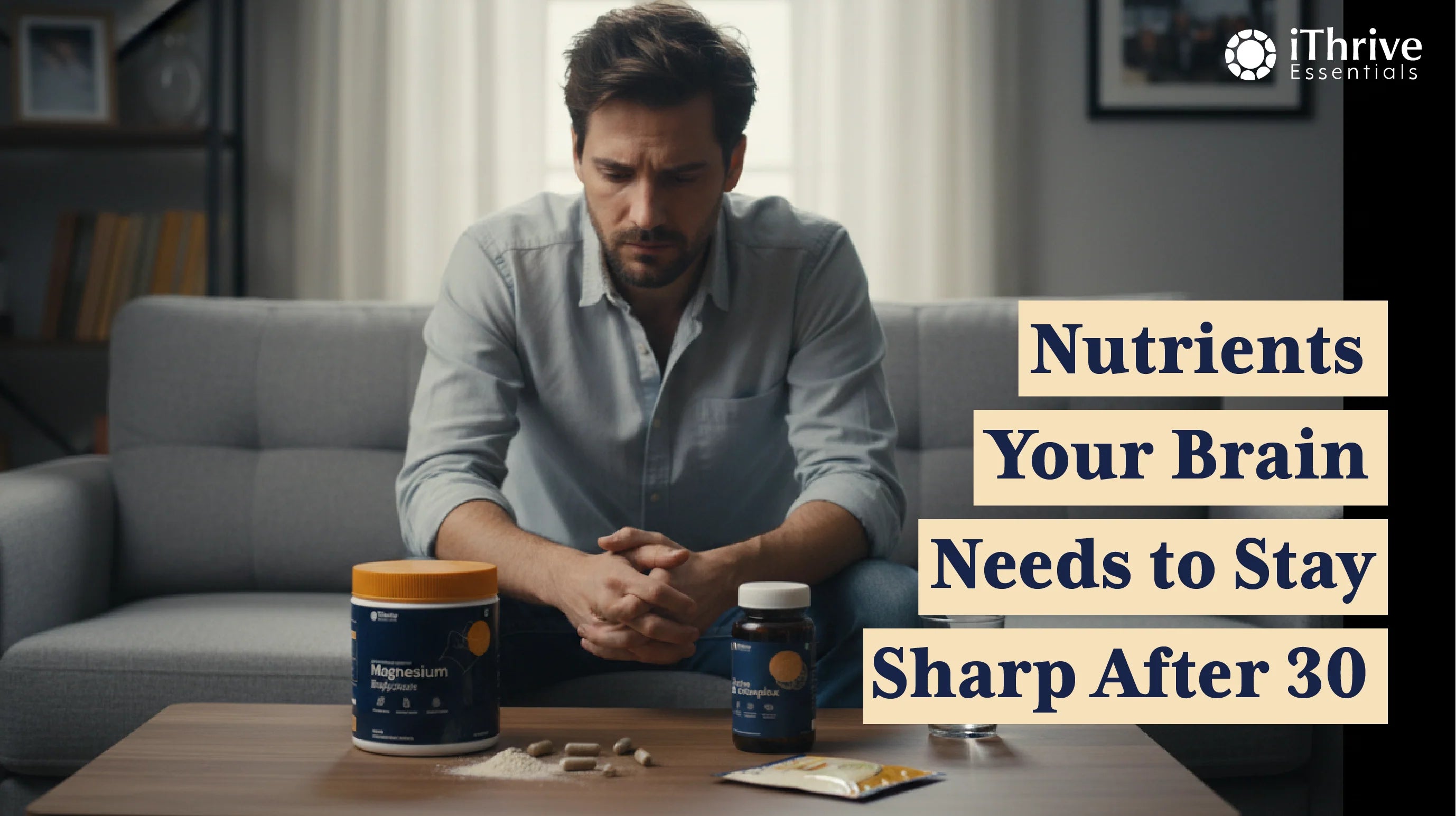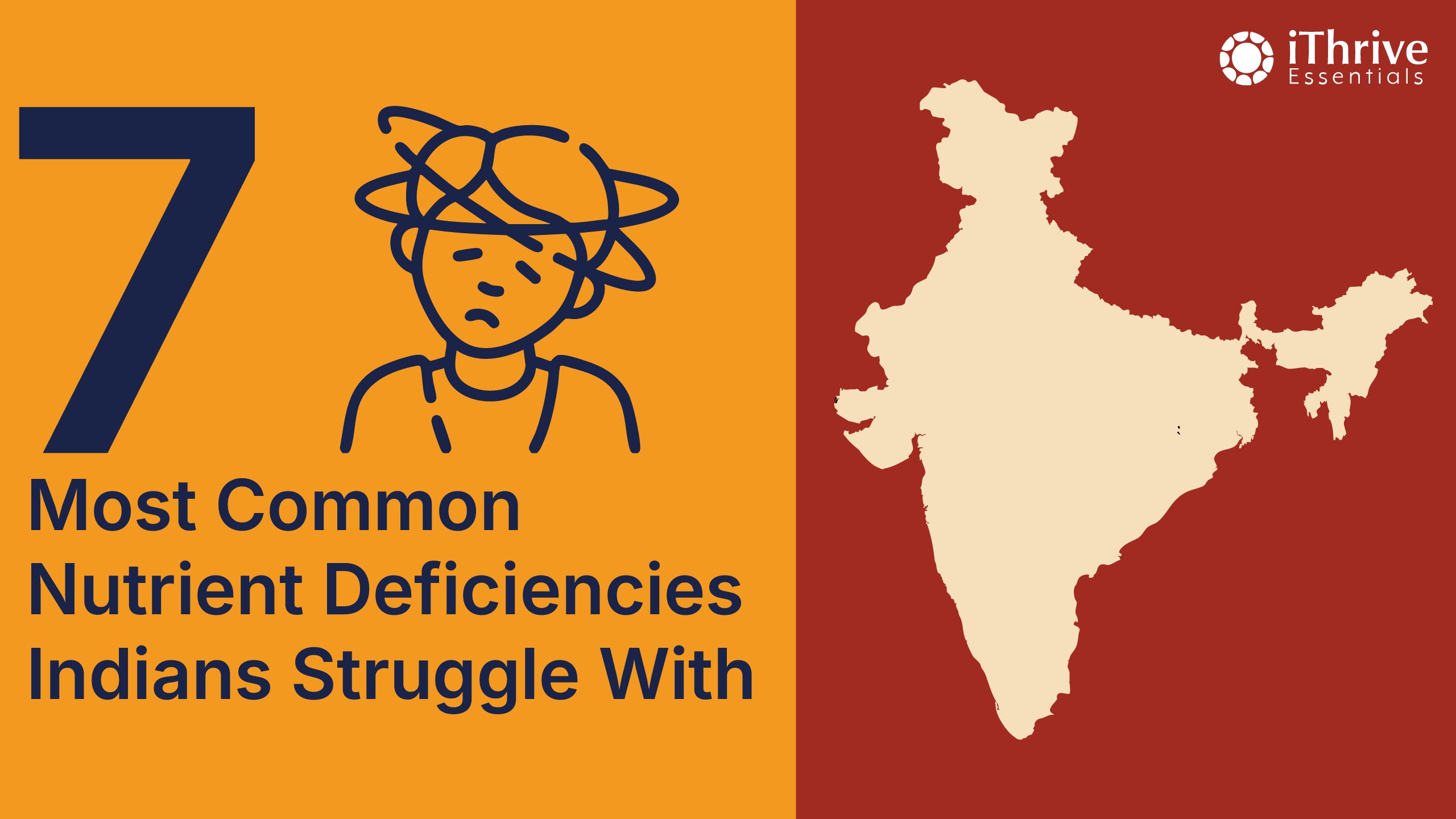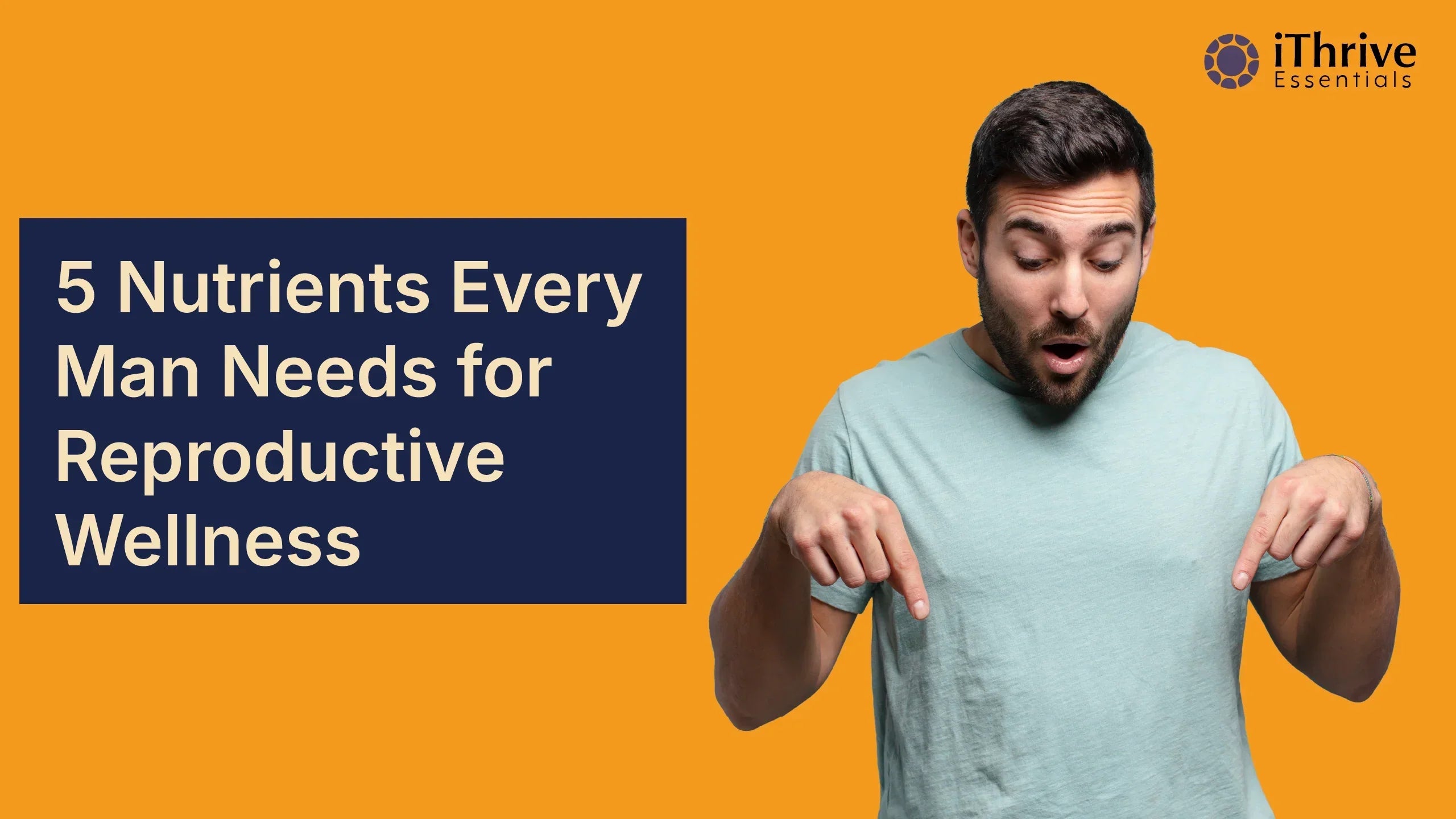
Nutrients Your Brain Needs to Stay Sharp After 30
Why Brain Health Needs More Attention After 30
As we age, our body starts to change and so does our brain. After 30, many people begin to notice small shifts in how their mind works. You might forget where you kept your phone, lose focus during long meetings, or feel mentally tired even after a good night’s sleep. These are small signs that your brain health after 30 needs more care and nourishment than before.
Research shows that after the age of 30, the brain’s blood flow and energy levels start to slowly decline. This means your brain cells get a little less oxygen and nutrients each year, which can affect memory, focus, and even mood.
Today’s lifestyle makes things tougher. Long screen hours, constant stress, processed foods, and poor sleep can all increase inflammation and oxidative stress in the brain that are two major reasons why mental clarity and sharpness fade faster.
The good news is that your brain has an amazing ability to heal and stay strong when you support it the right way. By giving it the best nutrients for cognitive function and making small lifestyle changes, you can keep your mind sharp, calm, and full of energy well beyond your 30s.
In this blog, we’ll focus on the key nutrients your brain needs after 30 to stay sharp, focused, full of energy and how you can get them naturally through food and supplements.
Key Nutrients Your Brain Needs After 30
1. Omega-3 Fatty Acids
Fats are not always bad in fact, your brain needs healthy fats to function properly. About 60% of the human brain is made of fat, and a large part of that is made up of Omega-3 fatty acids. These fats are essential because your body can’t produce them on its own, they must come from food or supplements.
Omega-3s, mainly DHA (Docosahexaenoic Acid) and EPA (Eicosapentaenoic Acid), are vital building blocks for brain cell membranes. They help neurons (brain cells) communicate smoothly, support memory, and reduce inflammation that can damage brain tissue.
Why Omega-3s Are Essential
- Cell structure: DHA helps keep brain cell membranes flexible, allowing signals to pass easily between neurons.
- Inflammation control: EPA reduces chronic inflammation, which is linked to depression, anxiety, and neurodegenerative diseases like Alzheimer’s.
- Neurotransmitter balance: Omega-3s help regulate dopamine and serotonin that are important chemicals that affect mood, motivation, and focus.
- Neuroprotection: They protect against oxidative stress, helping slow age-related cognitive decline.
How Aging Affects Omega-3 Levels
As you age, your body becomes less efficient at absorbing and converting Omega-3s. The enzymes that help turn plant-based Omega-3 (ALA) into DHA and EPA become weaker. This means even if you eat flaxseeds or walnuts, your body might not convert enough of them into active forms.
Low Omega-3 levels are often associated with:
- Poor memory and brain fog
- Mood changes, irritability, or anxiety
- Dry skin and weak hair
- Increased inflammation in the brain and body
Over time, this imbalance can contribute to cognitive decline and increased risk of Alzheimer’s or dementia.
How to Get Enough Omega-3
To maintain healthy brain function, it’s important to include direct sources of DHA and EPA in your diet.
Best food sources:
- Fatty fish: Salmon, mackerel, sardines, anchovies, and tuna
- Animal-based sources: Egg yolks (from pasture-raised chickens), lamb liver
- Plant-based options: Flaxseeds, chia seeds, walnuts, and algae oil (for vegetarians)
Supplement options:
If your diet doesn’t include enough fish, Krill oil or fish oil supplements are highly effective. Krill oil, in particular, is easily absorbed by the body and provides both DHA and EPA in a phospholipid form that your brain can use quickly.
You can also try iThrive Essentials Marine Omega-3 Complex that combines SuperbaBoost® krill oil with triple-strength Peruvian anchovy fish oil, stabilized & protected with AstaReal® astaxanthin and natural vitamin E. This unique combination delivers highly absorbable EPA and DHA, along with antioxidant protection, to support heart, brain, joints, skin, and cellular health. To know more about omega 3 check out this blog: Best Omega-3 Supplement: iThrive Essentials Marine Omega 3 Complex

2. B Vitamins (B6, B9, B12)
Your brain needs a steady supply of energy and good communication between nerve cells to function properly, and that’s what B vitamins for brain function helps with. They act like helpers that keep your brain active, your mood balanced, and your memory sharp. The most important ones for brain health are Methylated Forms of B9 & B12.
Why They’re Important
- They help your brain make “happy” chemicals: B6, B9, and B12 are needed to produce serotonin and dopamine, the chemicals that affect how you feel, think, and handle stress. Low levels can make you feel low, anxious, or easily irritated.
- They protect your memory: These vitamins help lower homocysteine in the blood. When this chemical builds up too much, it can damage brain cells and increase the risk of memory loss.
- They give your brain energy: Your brain runs on glucose for energy, and B vitamins help convert the food you eat into that fuel. Without enough of them, your brain feels tired and foggy.
- They keep your nerves healthy: Vitamin B12, in particular, keeps the protective covering around your nerves (called the myelin sheath) strong which helps messages travel quickly in your brain.
What Happens As You Age
As you get older, your body becomes less efficient at absorbing these vitamins, especially B12. This happens because stomach acid, which helps release B12 from food naturally decreases with age.
This is why many people after 30 experience:
- Brain fog or forgetfulness
- Tiredness even after good sleep
- Low mood or irritability
- Numbness or tingling in hands and feet (in severe deficiency)
If left unchecked for years, low B12 and folate levels can even increase the risk of depression and cognitive decline.
How to Get Enough B Vitamins
You can get B vitamins easily from your diet:
- B6: Chickpeas, fish, potatoes, and bananas
- B9 (Folate): Spinach, lentils, broccoli, and avocados
- B12: Eggs, fish, liver, shitake mushroom, and spirulina
If you follow a vegetarian or vegan diet, it’s important to get enough B12 since plant foods don’t naturally contain it. You can try iThrive Essentials Active B-Complex, which provides all essential B-vitamins in their active forms making them easier for your body to absorb and use. It supports energy, focus, and brain health, while also helping balance your mood and nervous system naturally.
Check out our blog: How Our Clients Felt the Difference After Taking the B-Complex Supplement

3. Vitamin D
You might think Vitamin D is just for keeping your bones strong but no, it also plays a crucial role in supporting your brain and mental health. This sunshine vitamin helps your brain cells communicate better, boosts mood-regulating hormones like serotonin, and even protects against memory decline as you age.
Your brain has Vitamin D receptors in almost every region, especially in areas linked to memory, mood, and learning. This means your brain actively depends on Vitamin D to function well every single day.
Here’s how Vitamin D helps your brain:
- Supports brain development and repair: Vitamin D helps in the growth of new neurons (brain cells) and supports the repair of old or damaged ones. It keeps your brain’s communication network strong and efficient, which is crucial for learning and memory.
- Regulates mood and emotions: Vitamin D affects the production of serotonin, often called the “feel-good” hormone. Low levels of Vitamin D can reduce serotonin activity, which is why deficiency is commonly linked with mood disorders like depression or anxiety.
- Protects against inflammation and toxins: Vitamin D works like a natural anti-inflammatory for your brain. It reduces harmful chemicals (called cytokines) that cause inflammation and damage brain cells over time.
- Supports brain immunity: The brain has its own immune defense system. Vitamin D helps regulate it, protecting brain tissue from chronic inflammation that could otherwise contribute to memory loss or neurodegenerative diseases.
- Enhances cognitive performance: Studies have shown that people with adequate Vitamin D levels tend to perform better on tests of memory, attention, and problem-solving than those who are deficient.
What Happens As You Age
After 30, the body becomes less efficient at producing Vitamin D from sunlight. Spending more time indoors or using sunscreen (though necessary for skin protection) also reduces natural Vitamin D production.
Low Vitamin D levels can lead to:
- Tiredness and low mood
- Brain fog and slower thinking
- Poor concentration
- Higher risk of depression or anxiety
Studies have even shown that people with chronic Vitamin D deficiency are more likely to develop cognitive decline later in life.
How to Get Enough
Try to get 10–20 minutes of sunlight on your skin every morning without sunscreen (before 10 a.m. or after 4 p.m.) for safe exposure.
Food sources:
- Fatty fish like salmon, sardines, and tuna
- Egg yolks
- Mushrooms exposed to sunlight
If you don’t get enough sunlight or spend most of your time indoors, your body might not make enough Vitamin D naturally. You can try iThrive Essentials Vitamin D3 + K2, which supports better absorption and utilization of calcium while boosting mood, brain function, and immunity. This combination helps maintain strong bones and a sharper, more focused mind naturally.
Check out the blog on: Low Vitamin D Levels May Be Linked to Increased Risk of Mental Health Issues

4. Magnesium
Magnesium plays a powerful role in keeping your brain and nervous system balanced. It supports over 300 vital processes in your body, many of which directly influence how clearly you think, how well you sleep, and how calmly you respond to stress. Often called the body’s natural relaxant, magnesium helps your brain unwind, improves focus, and supports deeper, more restorative sleep.
Why Magnesium Is Important
- Supports brain communication: Magnesium helps regulate signals between your brain cells (neurons). Without enough of it, these signals can become overactive, leading to anxiety, restlessness, or poor concentration.
- Improves mood and reduces stress: It helps control the release of stress hormones like cortisol. Adequate magnesium keeps your nervous system calm and stable, making you feel more balanced and less anxious.
- Enhances memory and learning: Magnesium strengthens the connections between brain cells, which improves memory formation and learning ability.
- Improves sleep quality: It supports the production of melatonin (the sleep hormone) and helps your muscles and mind relax, making it easier to fall asleep and wake up refreshed.
- Protects against brain aging: Magnesium fights inflammation and oxidative stress in the brain, helping to reduce the risk of age-related cognitive decline and neurodegenerative diseases.
How Aging Affects Magnesium Levels
As you age, your body’s ability to absorb magnesium from food decreases. Stress, poor diet, high caffeine intake, and certain medications (like diuretics or antacids) can also lower magnesium levels.
Low magnesium often shows up as:
- Trouble sleeping
- Anxiety or mood swings
- Brain fog and fatigue
- Muscle cramps or twitching
Long-term deficiency can even increase the risk of insulin resistance and chronic inflammation, which further harm brain health.
How to Get Enough Magnesium
Food sources:
- Pumpkin seeds
- Almonds
- Dark chocolate (minimum 70% cocoa)
- Avocados
If your diet doesn’t provide enough magnesium or you often feel stressed and low on energy, you can try iThrive Essentials Magnesium Bisglycinate. It’s a highly absorbable form that supports relaxation, improves focus, and helps calm your nervous system. Regular use can promote better sleep, sharper thinking, and a more balanced mood naturally.
Check out our blog on: Before You Try Sleeping Pills, Read This About Magnesium

5. CoQ10 (Coenzyme Q10)
CoQ10 is like your brain’s energy booster. It helps your cells make energy and protects them from everyday damage. As you age, your natural CoQ10 levels drop, which can make you feel tired and affect your brain’s sharpness. Getting enough CoQ10 keeps your brain cells active, supports memory, and helps you stay mentally al
Why CoQ10 Is Important
- Boosts brain energy: CoQ10 plays a key role in producing ATP (adenosine triphosphate). When your CoQ10 levels drop, your brain cells don’t get enough energy to perform tasks efficiently, leading to mental fatigue and slower thinking.
- Protects against oxidative stress: The brain uses a lot of oxygen, which naturally produces free radicals. CoQ10 acts as a strong antioxidant, neutralizing these free radicals and preventing them from damaging brain cells.
- Supports mitochondrial function: Mitochondria is known as the powerhouse of your cells, and it depends on CoQ10 to work properly. It helps them generate energy and reduces the oxidative damage that leads to aging and cognitive decline.
How Aging Affects CoQ10 Levels
Your body naturally produces CoQ10, but its production starts to decline after your mid-20s and drops sharply after 30. This decline, combined with increased oxidative stress, means your brain cells may not get enough energy and protection as you age.
Signs of low CoQ10 include:
- Mental and physical fatigue
- Brain fog
- Reduced concentration
- Mood imbalance
People who take cholesterol-lowering drugs (statins) are especially prone to low CoQ10 levels since these medications block its production.
How to Get Enough CoQ10
Food sources:
- Fatty fish (salmon, mackerel, sardines)
- Organ meats (like liver and heart)
- Broccoli
However, the amount of CoQ10 in food is quite small, so supplements are often recommended especially after 30. If your energy levels often feel low or you experience brain fog, you can try iThrive Essentials CoQ10. It helps support healthy energy production in your cells, keeps your brain sharp, and protects against oxidative stress. Regular use can help you feel more energetic, focused, and mentally refreshed.
Explore more information about CoQ10 here: What Is CoQ10 and L- Carnitine, and How Can It Change Your Life?

Conclusion
As you move past your 30s, your brain deserves a little extra care, just like the rest of your body. Supporting it with the right nutrients can make a big difference in how you think, feel, and function every day. From Omega-3s and Vitamin D to B vitamins, Magnesium, and CoQ10, these nutrients work together to keep your brain cells healthy, your mood balanced, and your memory sharp.
And remember, it’s not just about supplements but a balanced diet, regular movement, good sleep, and sunlight all play a role in keeping your mind vibrant. But if you’re struggling to get enough of these nutrients naturally, iThrive Essentials can help you fill those gaps safely and effectively.




Leave a comment
This site is protected by hCaptcha and the hCaptcha Privacy Policy and Terms of Service apply.